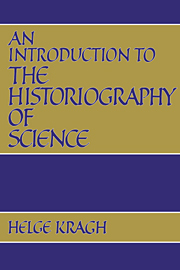Book contents
- Frontmatter
- Contents
- Preface
- 1 Aspects of the development of the history of science
- 2 History of science
- 3 Objectives and justification
- 4 Elements of theory of history
- 5 Objectivity in history
- 6 Explanations
- 7 Hypothetical history
- 8 Structure and organization
- 9 Anachronical and diachronical history of science
- 10 Ideology and myths in the history of science
- 11 Sources
- 12 Evaluation of source materials
- 13 Scientists' histories
- 14 Experimental history of science
- 15 The biographical approach
- 16 Prosopography
- 17 Scientometric historiography
- Notes
- Bibliography
- Index
15 - The biographical approach
Published online by Cambridge University Press: 30 November 2009
- Frontmatter
- Contents
- Preface
- 1 Aspects of the development of the history of science
- 2 History of science
- 3 Objectives and justification
- 4 Elements of theory of history
- 5 Objectivity in history
- 6 Explanations
- 7 Hypothetical history
- 8 Structure and organization
- 9 Anachronical and diachronical history of science
- 10 Ideology and myths in the history of science
- 11 Sources
- 12 Evaluation of source materials
- 13 Scientists' histories
- 14 Experimental history of science
- 15 The biographical approach
- 16 Prosopography
- 17 Scientometric historiography
- Notes
- Bibliography
- Index
Summary
Biographies of eminent, individual scientists are one of the oldest forms of history of science. However, in the new, professional history of science it has been regarded as a less-esteemed form of history, to some degree. It is only recently that this trend has been reversed. The diminishing respectability of the biography is connected with modern standards of scholarship in history of science and with a change in general perspective where the focus has to some extent moved to either intellectual or social topics. Biographical works are still, however, an important part of history of science and they will remain so. Even though biographies are often of dubious quality, as seen from a history of science point of view, they can carry out functions not covered by other forms of history.
Since the scientific biography is built up around the activities of an individual it can easily veer towards giving a distorted picture of the development of science. Namely by, in the very nature of things, concentrating on the achievements of the scientist whose life story is being told, and thereby possibly glorifying these, while other scientists merely appear as a grey background. The fact that a biography is written from a person-centred perspective does not in itself merit criticism and is not in itself a sign of lack of objectivity. The biographer, however, will often be tempted to identify himself with the subject and present the portrayed scientist as a hero; while his opponents and rivals are presented as villains. When this happens, the biography degenerates into so-called hagiography, uncritical black and white history.
- Type
- Chapter
- Information
- An Introduction to the Historiography of Science , pp. 168 - 173Publisher: Cambridge University PressPrint publication year: 1987

